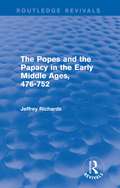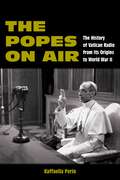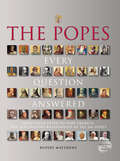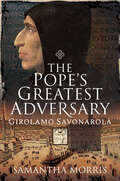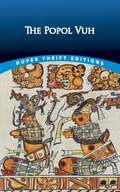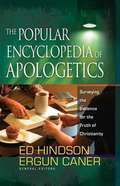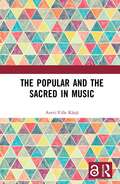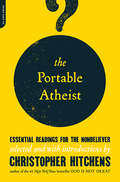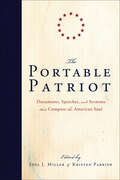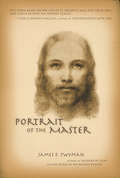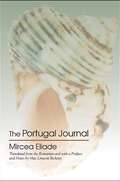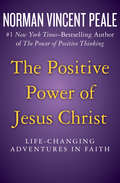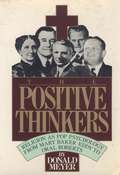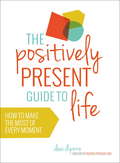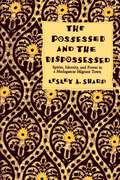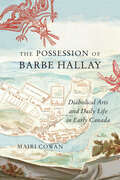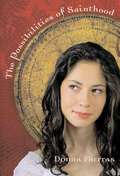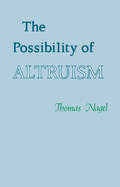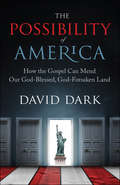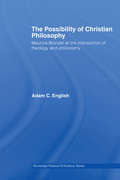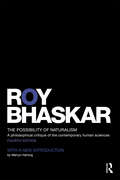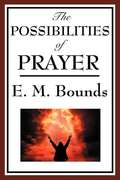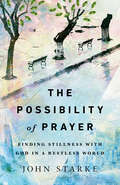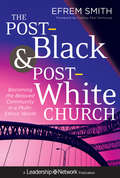- Table View
- List View
The Popes and the Papacy in the Early Middle Ages: 476-752 (Routledge Revivals)
by Jeffrey RichardsThere has been a tendency to the view the history of the early medieval papacy predominantly in ideological terms, which has resulted in the over-exaggeration of the idea of the papal monarchy. In this study, first published in 1979, Jeffrey Richards questions this view, arguing that whilst the papacy’s power and responsibility grew during the period under discussion, it did so by a series of historical accidents rather than a coherent radical design. The title redresses the imbalance implicit in the monarchical interpretation, and emphasizes other important political, administrative and social aspects of papal history. As such it will be of particular value to students interested in the history of the Church; in particular, the development of the early medieval papacy, and the shifting policies and characteristics of the popes themselves.
The Popes on Air: The History of Vatican Radio from Its Origins to World War II (World War II: The Global, Human, and Ethical Dimension)
by Raffaella PerinThe story of the origin of Vatican Radio provides a unique look at the history of World War IIThe book offers the first wide-ranging study on the history of Vatican Radio from its origins (1931) to the end of Pius XII’s pontificate (1958) based on unpublished sources. The opening of the Secret Vatican Archives on the records regarding Pius XII will shed light on the most controversial pontificate of the 20th century. Moreover, the recent rearrangement of the Vatican media provided the creation of a multimedia archive that is still in Fieri.This research is an original point of view on the most relevant questions concerning these decades: the relation of the Catholic Church with the Fascist regimes and Western democracies; the attitude toward anti-Semitism and the Shoah in Europe, and in general toward the total war; the relationship of the Holy See with the new media in the mass society; the questions arisen in the after-war period such as the Christian Democratic Party in Italy; the new role of women; and anti-communism and the competition for the consensus in the social and moral order in a secularized society.
The Popes: Every Question Answered
by Rupert MatthewsThis comprehensive historical reference covers the Apostolic Succession from St. Peter to Pope Francis, plus a selection of Papal Bulls and teachings.The papacy is a unique religious office. Lasting two millennia, it is one of the oldest and most enduring institutions in the world. The line of authority linking the current pope to the ministry of Jesus Christ has continued unbroken over the centuries.The Popes: Every Question Answered presents pertinent facts and fascinating details about all 266 popes, from St. Peter to Pope Francis I. Covering controversies, triumphs, and reforms from the Late Roman Period to the twenty-first century, this is an indispensable reference guide for theological students and people of all faiths.</
The Pope’s Greatest Adversary: Girolamo Savonarola
by Samantha MorrisOn 24 May 1497 Girolamo Savonarola was led out to a scaffold in the middle of the Piazza della Signoria. Crowds gathered around and watched as he was publically humiliated before being hanged and burned. But what did this man do that warranted such a horrendous death? Born on 21 September 1458 in Ferrara, Girolamo Savonarola would join the Dominican order of friars and find his way to the city of Florence. Run by the Medici family, the city was used to opulence and fast living but when the unassuming Dominican showed up, the people were unaware that he was about to take their world by storm. Preaching before the people of Florence to an increasingly packed out Cathedral, Savonarola came to be called a prophet. And when Charles VIII invaded Italy with his French army, one of his so called prophecies came true. It was enough for the people to sit up and take note, allowing this man to become the defacto ruler of Florence. Except Girolamo Savonarola made one very fatal mistake – he made an enemy of Alexander VI, the Borgia Pope, by preaching against his corruption and attempting to overthrow him. It would prove to be his ultimate undoing – the Pope turned the Florentines who had so loved the friar against him and he ended his days hanging above a raging inferno.
The Popol Vuh: Mythic And Heroic Sagas Of The Kiches Of Central America (Dover Thrift Editions #No. 16)
by Lewis SpenceTranscribed from the original Mayan hieroglyphs, the Popol Vuh relates the mythology and history of the Kiché people of the Guatemalan Highlands of Central America. As is often the case with ancient texts, the Popol Vuh's significance lies in the scarcity of early accounts of Mesoamerican cultures, largely due to the purging of documents by the Spanish conquistadors. Today there remains no document of greater importance to the study of pre-Columbian mythology. This text of the Popol Vuh — which is translated variously as "Book of the Community," "Book of Counsel," or, more literally, "Book of the People" — begins as pure mythology and gradually develops into pure history, progressing from heroic legends to the deeds of authentic historical figures. It tells of the gods who created mankind, as well as a great flood and other stories with intriguing parallels to the myths of different cultures. This edition features the classic translation by the distinguished folklorist Lewis Spence.
The Popular Encyclopedia of Apologetics: Surveying the Evidence for the Truth of Christianity
by Steve Miller Ed Hindson Ergun Caner Edward J. VerstraeteThe perfect combination of scholarship and accessible presentation for Christians who desire to know how to better understand and defend their faith. <P><P>Bestselling authors Ed Hindson and Ergun Caner have brought together a who's who of apologetic experts—including Lee Strobel, Norm Geisler, Josh McDowell, and John Ankerberg—to produce a resource that's both easy to understand and comprehensive in scope. <P><P>Every entry provides a biblical perspective and mentions the key essentials that believers need to know about a wide variety of apologetic concerns, including... <P><P>issues concerning God, Christ, and the Biblescientific and historical controversiesethical matters (genetic engineering, homosexuality, ecology, feminism)a Christian response to world religions and cultsa Christian response to the major worldviews and philosophies of our day <P><P>Included with each entry are practical applications for approaching or defending the issue at hand, along with recommendations for additional reading on the subject.
The Popular and the Sacred in Music
by Antti-Ville KärjäMusic, as the form of art whose name derives from ancient myths, is often thought of as pure symbolic expression and associated with transcendence. Music is also a universal phenomenon and thus a profound marker of humanity. These features make music a sphere of activity where sacred and popular qualities intersect and amalgamate. In an era characterised by postsecular and postcolonial processes of religious change, re-enchantment and alternative spiritualities, the intersections of the popular and the sacred in music have become increasingly multifarious. In the book, the cultural dynamics at stake are approached by stressing the extended and multiple dimensions of the sacred and the popular, hence challenging conventional, taken-for-granted and rigid conceptualisations of both popular music and sacred music. At issue are the cultural politics of labelling music as either popular or sacred, and the disciplinary and theoretical implications of such labelling. Instead of focussing on specific genres of popular music or types of religious music, consideration centres on interrogating musical situations where a distinction between the popular and the sacred is misleading, futile and even impossible. The topic is discussed in relation to a diversity of belief systems and different repertoires of music, including classical, folk and jazz, by considering such themes as origin myths, autonomy, ingenuity and stardom, authenticity, moral ambiguity, subcultural sensibilities and political ideologies.
The Portable Atheist: Essential Readings for the Nonbeliever
by Christopher HitchensFrom the #1 New York Times best-selling author of God Is Not Great, a provocative and entertaining guided tour of atheist and agnostic thought through the ages--with never-before-published pieces by Salman Rushdie, Ian McEwan, and Ayaan Hirsi Ali.Christopher Hitchens continues to make the case for a splendidly godless universe in this first-ever gathering of the influential voices--past and present--that have shaped his side of the current (and raging) God/no-god debate. With Hitchens as your erudite and witty guide, you'll be led through a wealth of philosophy, literature, and scientific inquiry, including generous portions of the words of Lucretius, Benedict de Spinoza, Charles Darwin, Karl Marx, Mark Twain, George Eliot, Bertrand Russell, Emma Goldman, H. L. Mencken, Albert Einstein, Daniel Dennett, Sam Harris, Richard Dawkins, and many others well-known and lesser known. And they're all set in context and commented upon as only Christopher Hitchens--"political and literary journalist extraordinaire" (Los Angeles Times)--can. Atheist? Believer? Uncertain? No matter: The Portable Atheist will speak to you and engage you every step of the way.
The Portable Patriot: Documents, Speeches, and Sermons that Compose the American Soul
by Joel J. Miller & Kristen ParrishWhat does it mean to think, believe, and act like an American? Get the Declaration of Independence, the Constitution, the Bill of Rights, and other important United States historical documents all in one book!The soul of America is far more than a concept—it is a people. Even the most sacred principles mean very little unless lived out passionately by an informed citizenry. In The Portable Patriot you&’ll find a carefully assembled sampling of American history&’s most formative words, written by the people who made that extraordinary history—George Washington, Alexander Hamilton, Benjamin Franklin, and many more of America's Founding Fathers. Speeches and sermons, essays and extracts, poems and proclamations illumine such values as independence, virtue, humility, bravery, thrift, prayer, enterprise, liberty, and reliance on God. While peering back to the cradle of America&’s national identity, The Portable Patriot also points a way forward, compelling us to heed poet John Dickinson&’s plea to &“rouse your bold hearts at fair Liberty&’s call.&”&“Nothing ignites a patriot&’s heart—or the hope that the truths of our founding era will prevail again—like the documents assembled in The Portable Patriot. How grateful we should be, and how quick to make these historic words our own.&” ?Stephen Mansfield, author, The Forgotten Founding Father and The Faith of the American Soldier&“Our current struggles over taxation, federal debt, and limited government are part of a larger American story. Kudos to Miller and Parrish for highlighting these essential passages.&” ?Hon. Andrew P. Napolitano, Senior Judicial Analyst, Fox News Channel
The Porter of St. Bonaventure's
by James Patrick DerumThis is a well-researched biography of a deeply righteous and truly humble priest. It traces his life from childhood in the Western United States, through his labors in the lumber mills and the railroads, to his priestly vocations with his many sufferings, then to the enormous influence he had on thousands of people.
The Portrait of the Master
by Gregg Braden James TwymanSt. Francis has decided to travel to the Crusades and arrange a meeting between himself and the Sultan in Syria, believing that if the Sultan knew what Jesus was really trying to say that he would stop the terrible war on his own.
The Portugal Journal (SUNY series, Issues in the Study of Religion)
by Mircea EliadeDetailing a fascinating, hitherto unknown period in the life of one of the twentieth century's preeminent intellectuals, The Portugal Journal was written by Mircea Eliade from 1941–1945, when he served as a diplomat in Lisbon. Eliade's work as a theorist of religion has been the chief influence on how religion is understood and studied in contemporary times and he is also increasingly well known as a writer of fiction and drama. Long awaited by readers, The Portugal Journal is the only one of Eliade's journals to be published in its entirety, unedited by its author. Here, Eliade writes frankly, at times about things that he could never bring himself to make public, including his relationship with the Iron Guard, his problems with hypersexuality, his religious beliefs and actions, his admiration for René Guénon, and his sufferings and terrible grief both before and after his wife's death."With WWII as the historical context, this journal is fascinating to read because Eliade invites the reader into the interior of his troubled mind. The journal is replete with existential pathos, anxiety, loss, fear, danger, suffering, sorrow, and happy moments. Readers will be rewarded with some surprises, without political apologies for being on the wrong side during the war." — Carl Olson, author of The Theology and Philosophy of Eliade: A Search for the CentreMac Linscott Ricketts is Professor Emeritus of Religion at Louisburg College. He is the translator of a number of Mircea Eliade's works, including Journal I, 1945–1955, Journal IV, 1979–1985, and Autobiography I and II.
The Positive Power of Jesus Christ: Life-Changing Adventures in Faith
by Norman Vincent PealeInspiring stories of the transformative power of the Savior's love in today's world One of the most inspirational and influential spiritual leaders of the 20th century, minister and bestselling author Norman Vincent Peale transformed the lives of millions worldwide with his groundbreaking book, The Power of Positive Thinking. In The Positive Power of Jesus Christ, the revered pastor of the world-famous Marble Collegiate Church proclaims his unshakable faith in Christ the Savior with inspiring stories of healing and hope, of the ways in which his life and the lives of others were profoundly touched by the holy hand of God's Son. In this beautiful, everlasting work, Dr. Peale contends that, "positive thinking really means a faith attitude . . . [and] only faith can turn the life around." In sharing these thrilling true accounts of people from all walks of life who have experienced the positive saving power of Christ--including his own powerful witnessing of the Savior's work--Peale offers a humble tribute to our blessed Lord, demonstrating the many ways in which His love can truly change the world.
The Positive Thinkers
by Donald MeyerThe subject of Professor Meyer's superb study concerns the dissolution of the Protestant ethic, its relationship to a general failure of nerve within the American community, and the consequent rise of a pseudo-theology in the guise of a pseudo-psychology, as reflected through the work of certain "mind-cure" practitioners, from Mary Baker Eddy to Norman Vincent Peale. It is a subject largely ignored by intellectuals, and Professor Meyer, in taking it out of the domain of the Reader's Digestor similar habitations, has produced a real service, not only to sociology and political science, disciplines in which he is very well versed, but also to mass-culture and the vague but insidious ethos behind it. In describing what the sub-title states as "the American Quest for Health, Wealth, and Personal Power," Professor Meyer works from an historical perspective, does not beat any drums nor ride any hobby horse; scholarly care and an in-depth generosity illuminate a number of intricate concepts, whether they be "individualism," laissez-faire industry or the peculiar role and influence of women within society. His work is schematized yet fluid, showing how a process of ego-disintegration has paradoxically resulted out of the improperly understood religious orientation of the past and the anxiety-ridden religious revival of the present. Today God "means" Adjustment.--Virgina Kirkus, Kirkus Reviews
The Positively Present Guide to Life
by Dani DipirroIn this practical guide to positive thinking, Dani DiPirro explores how to be more 'positively present' at home, at work, in relationships and through times of change, inspiring readers to simply be the happiest they can be.
The Possessed and the Dispossessed: Spirits, Identity, and Power in a Madagascar Migrant Town (Comparative Studies of Health Systems and Medical Care #37)
by Lesley A. SharpThis finely drawn portrait of a complex, polycultural urban community in Madagascar emphasizes the role of spirit medium healers, a group heretofore seen as having little power. These women, Leslie Sharp argues, are far from powerless among the peasants and migrant laborers who work the land in this plantation economy. In fact, Sharp's wide-ranging analysis shows that tromba, or spirit possession, is central to understanding the complex identities of insiders and outsiders in this community, which draws people from all over the island and abroad. Sharp's study also reveals the contradictions between indigenous healing and Western-derived Protestant healing and psychiatry. Particular attention to the significance of migrant women's and children's experiences in a context of seeking relief from personal and social ills gives Sharp's investigation importance for gender studies as well as for studies in medical anthropology, Africa and Madagascar, the politics of culture, and religion and ritual. This title is part of UC Press's Voices Revived program, which commemorates University of California Press’s mission to seek out and cultivate the brightest minds and give them voice, reach, and impact. Drawing on a backlist dating to 1893, Voices Revived makes high-quality, peer-reviewed scholarship accessible once again using print-on-demand technology. This title was originally published in 1993.
The Possession of Barbe Hallay: Diabolical Arts and Daily Life in Early Canada (McGill-Queen's Studies in Early Canada / Avant le Canada)
by Mairi CowanWhen strange signs appeared in the sky over Québec during the autumn of 1660, people began to worry about evil forces in their midst. They feared that witches and magicians had arrived in the colony, and a teenaged servant named Barbe Hallay started to act as if she were possessed. The community tried to make sense of what was happening, and why. Priests and nuns performed rituals to drive the demons away, while the bishop and the governor argued about how to investigate their suspicions of witchcraft. A local miller named Daniel Vuil, accused of using his knowledge of the dark arts to torment Hallay, was imprisoned and then executed.Stories of the demonic infestation circulated through the small settlement on the St Lawrence River for several years. In The Possession of Barbe Hallay Mairi Cowan revisits these stories to understand the everyday experiences and deep anxieties of people in New France. Her findings offer insight into beliefs about demonology and witchcraft, the limits of acceptable adolescent behaviour, the dissonance between a Catholic colony in theory and the church’s wavering influence in practice, the contested authority accorded to women as healers, and the insecurities of the colonial project. As the people living through the events knew at the time, and as this study reveals, New France was in a precarious position.The Possession of Barbe Hallay is both a fascinating account of a case of demonic possession and an accessible introduction to social and religious history in early modern North America.
The Possibilities of Sainthood
by Donna FreitasWhile regularly petitioning the Vatican to make her the first living saint, Antonia Labella prays to assorted patron saints for every help with preparing the family's fig trees for a Rhode Island winter to getting her first kiss from the right boy.
The Possibility of Altruism
by Thomas NagelJust as there are rational requirements on thought, there are rational requirements on action. This book defends a conception of ethics, and a related conception of human nature, according to which altruism is included among the basic rational requirements on desire and action.
The Possibility of America: How The Gospel Can Mend Our God-blessed, God-forsaken Land
by David DarkPublished in the years following 9/11, David Dark’s book The Gospel according to America warned American Christianity about the false worship that conflates love of country with love of God. It delved deeply into the political divide that had gripped the country and the cultural captivity into which so many American churches had fallen. <P><P> In our current political season, the problems Dark identified have blossomed. The assessment he brought to these problems and the creative resources for resisting them are now more important than ever. Into this new political landscape and expanding on the analysis of The Gospel according to America, Dark offers The Possibility of America: How the Gospel Can Mend Our God-Blessed, God-Forsaken Land. Dark expands his vision of a fractured yet redeemable American Christianity, bringing his signature mix of theological, cultural, and political analysis to white supremacy, evangelical surrender, and other problems of the Trump era.
The Possibility of Christian Philosophy: Maurice Blondel at the Intersection of Theology and Philosophy (Routledge Radical Orthodoxy #Vol. 2)
by Adam C. EnglishThis is the first to book to explore Blondel's entire body of work and provides an introduction to his life and writings and their relevance to the debates surrounding the radical orthodoxy identity. Detailing Blondel's impressive research output during the first half of the twentieth century, this volume highlights his relevance to philosophy and religion today and his commitment that philosophy cannot be separated from a theological narrative. This highly original work will be of great interest to scholars of philosophy and religion, particularly the students of the radical orthodoxy movement.
The Possibility of Naturalism: A philosophical critique of the contemporary human sciences (Critical Realism Ser.)
by Roy BhaskarSince its original publication in 1979, The Possibility of Naturalism has been one of the most influential works in contemporary philosophy of science and social science. It is one of the cornerstones of the critical realist position, which is now widely seen as offering perhaps the only viable alternative to positivism and post positivism. This fourth edition contains a new foreword from Mervyn Hartwig, who is founding editor of the Journal of Critical Realism and editor and principal author of the Dictionary of Critical Realism.
The Possibility of Prayer
by E. M. BoundsPray, Pray and Pray some more! God loves it and the Devil hates it. E. M. Bounds offered perhaps a more profound understanding of prayer than any other contemporary Christian thinker. His classic books on the personal communication with God explore how prayer must come from the whole being and strengthens faith in Christian lives. It is through prayer that we share our thoughts and desires our father God. Doing good works, communion, church activities and the like, do not and should not replace prayer. Prayer must be a priority in our lives. "Prayer should be the breath of our breathing, the thought of our thinking, the soul of our feeling, and the life of our living, the sound of our hearing, the growth of our growing. Prayer in its magnitude is length without end, width without bounds, height without top, and depth without bottom. Illimitable in its breadth, exhaustless in height, fathomless in depths and infinite in extension." In The Possibilities of Prayer E. M. Bounds addresses; The Ministry of Prayer, Prayer and the Promises, Its Possibilities, Answered Prayer, Divine Providence and much more. Edward McKendree Bounds was a clergyman of the Methodist Episcopal Church South and author of eleven books, nine of which focused on the subject of prayer. Bounds was a practicing lawyer at age nineteen and after three years, began preaching for the Methodist Episcopal Church, South. At the time of his pastorate in Brunswick, Missouri, war was declared. Bounds became a prisoner of war after refusing to take the oath of allegiance to the Federal Government. Upon release he served as chaplain of the Fifth Missouri regiment until the close of the war.
The Possibility of Prayer: Finding Stillness with God in a Restless World
by John StarkeThe world clamors for efficiency and productivity.
The Post-Black and Post-White Church
by Efrem SmithA blueprint for missional, multi-ethnic Christian communityEfrem Smith, an internationally recognized and innovative African-American leader, offers a workable plan for connecting theology, practical ministry models, and real stories of people in multi-ethnic Christian communities. Using the example of Jesus, Smith develops a theology of multi-ethnic and missional leadership. Embracing urban and ethnic subcultures such as hip-hop, this book provides a rich mix of multi-ethnic church development, reconciliation theology, missional church thinking, and Christian community.Provides a common-sense approach to creating a multi-ethnic Christian communityIncludes practical ministry models and real stories of people who are members of thriving multi-ethnic congregations Author is acclaimed African-American thought leader who planted and led a multi-ethnic churches of close to 1,000 and now leads a regional division of a denominational committed to ethnic, multi-ethnic, and missional churchesThis book is written for anyone wrestling with what it means to be a Christian in an increasingly multi-ethnic world polarized by class, politics, and race.
